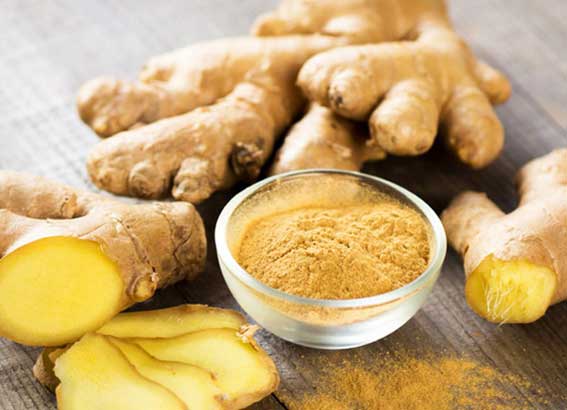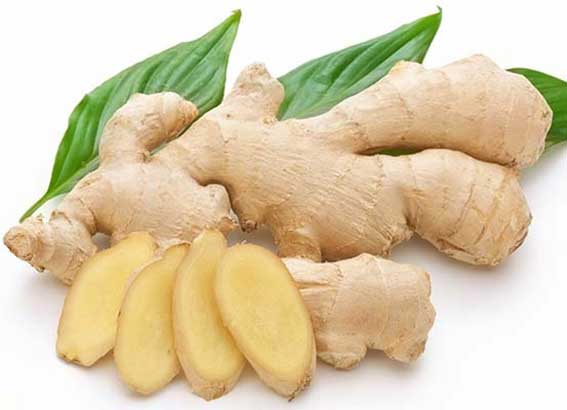Ginger is one of the ingredients that enhance the taste of dishes, bringing several very good uses for human health. Moreover, ginger is also present in several methods to help beautify the skin effectively. So what are the main effects of ginger and the notes when using ginger, let’s learn about 10 effects of ginger through today’s article.
1. Learn about the characteristics of the ginger plant
Not only is it a familiar spice, but ginger is also used as a spice and medicine. Its scientific name is Zinziber Officinal Rose.
Ginger is a herbaceous stem, the stem grows tubular, consisting of many closely related leaf sheaths, about 1m high. Rhizomes develop into bulbs, growing underground. Leaves alternate, lance-shaped, with midrib, fragrant when crushed. Ginger flowers do not grow from the stem, but from the bulb, the flower pillar is about 20cm long. The calyx is purple, about 1cm long. The flowers grow close together in clusters.

Ginger root does not have a specific shape. Ginger root is usually about 3-7 cm long, and more than 1cm thick. The surface is rough, with many nodes, with clear rounded veins. Ginger root is pale yellow or ash white. The cross-section is sparsely fibrous and has many bright spots.
Ginger is suitable for areas with short dry seasons and high air temperatures. Therefore, ginger has grown extremely popular in tropical countries such as Vietnam, China, Japan, etc. In Vietnam, ginger is grown a lot in the southern provinces.
Ginger has a peppery flavour, with a hint of lemon and a sharp aroma. Its pungent, spicy and aromatic taste can be attributed to the presence of essential oils and phenolic compounds such as gingerols and shogaols. Due to its strong and spicy aroma, ginger occupies an important place as a spice, delicacy and even medicine. In addition to being used fresh, it is dried, powdered, soaked, or used as juice or oil. Ginger tea is a favourite in our Vietnamese households and an excellent remedy for colds and flu.
2. 10 effects of ginger on health
Ginger is considered a “medicine cabinet” in Vietnam due to its various health benefits. Below are some medicinal uses of ginger.
Helps with weight loss: Ginger can easily reduce food consumption by adding ginger to the diet, heptaneGinger promotes satiety, which means fewer calories are needed while still feeling full. Ginger is also said to be a powerful natural agent that can suppress hunger and cravings. Ginger is also said to be an essential ingredient in weight loss because it is low in calories and can cause the body to produce heat. In addition, ginger also helps speed up metabolism and burn fat.
Ginger has a strong aphrodisiac ability: Modern medicine has researched and shown that fresh ginger contains nutrients such as chavicol, methyl heptenone, zingiberene, citral, etc. dilates blood vessels and promotes blood circulation in the body, increasing the amount of blood pumped to the penis, helping to improve erectile dysfunction very effectively. Using ginger to improve physiological problems in men is a method that has been used for a long time.
This method has the effect of supporting the treatment of erectile dysfunction, improving sexual ability, making the erection process of the penis easier and men can control their erectile ability.

Prevents cancer: Ginger root contains powerful antioxidants that help prevent cancer. One study found that ginger can slow the growth of colorectal cancer cells and may help reduce the risk of developing colon cancer. Ginger may also help prevent other types of cancer such as breast, lung, skin, pancreatic and prostate cancer. Adding a little ginger to your cup of tea in the morning will help you prevent dangerous diseases simply and conveniently.
Strengthens the immune system: Ginger can protect you against colds and flu during winter. This plant is rich in zinc, chromium, and magnesium, stimulates blood circulation, makes the body warmer, and reduces excessive sweating and fever. Combining ginger with lemon is also a way to protect the immune system. Drinking a cup of lemon ginger tea every day will help you stay healthy and happy no matter the season
Stir up the flavours of the dishes: Slightly sweet taste combined with spicy, pangolin, especially the unmistakable aroma of ginger will give any dish or drink a refreshing taste. Ginger is a versatile spice; it can be added to desserts, main dishes or drinks. In addition to traditional Asian dishes, ginger is often used as an ingredient in baked or roasted dishes. Using ginger when cooking dishes from poultry, or fish … can eliminate the fishy smell, making the dish more delicious.
Ginger Relieves Digestive Disorders: Ginger is said to be one of the most effective cures for stomach problems. It tends to accumulate in the digestive tract and reduces bloating. Ginger is also a good remedy for bloating and gas.
Stomach upsets, abdominal pain, and diarrhoea can also be alleviated and prevented by adding ginger to your diet. Ginger is also famous for its delicious taste. Not only does it stir up the taste of the dish, but it also promotes better assimilation and absorption of nutrients in your bloodstream.
Treating motion sickness: Many people are susceptible to motion sickness, especially seasickness. Ginger is a safer and more effective way to treat vomiting than conventional medicines. A little ginger powder can relieve and eliminate all the symptoms of vomiting, dizziness, cold sweats and nausea.
Reduces inflammation and pain: Ginger is widely known for its anti-inflammatory effects. Medical research shows that ginger is as effective as common pain relievers. Ginger helps relieve migraines, muscle pain, back pain and joint pain. Drinking tea with a small piece of ginger is an easy way to alleviate headaches and get a good night’s sleep. As for dealing with sore muscles after hours of exercise, you can add a few drops of ginger essential oil to water and soak in the bath for 20 minutes. In addition, one of the most effective remedies for menstrual cramps is ginger tea.
Eating ginger regularly prevents and treats gallstones: Using ginger regularly is very beneficial for preventing and treating gallstones. Gallstones are currently often treated with surgery and there is no specific effective treatment. Recent research by Japanese scientists said: It has been discovered that the ingredients in the spicy taste of fresh ginger have the effect of inhibiting the formation of Prostaglandin – a substance that causes gallstones. When the amount of prostaglandin in the body is too much, the amount of mucin (a type of protein) in bile may increase.
Muxin can combine with calcium and bilirubin ions in bile and form gallstones in the bile. Some substances in ginger root inhibit the synthesis of prostaglandins, thereby reducing the content of mucin in bile and can prevent gallstone disease. Thus, for people with gallstone disease, people at risk of this disease should regularly eat more ginger and some ginger-based preparations.
Treats Respiratory Problems: Due to ginger’s antihistamine properties, ginger is effective in treating allergies. It inhibits airway constriction and helps stimulate mucus secretion. For centuries, it has been used as a natural remedy for colds and flu. A teaspoon of ginger juice and honey is effective in relieving the persistent cough and sore throat associated with colds.
Ginger tea helps eliminate throat and nose congestion. A mixture of fresh ginger juice and fenugreek is very useful in curing asthma. Ginger is also found to help treat stomach flu or food poisoning. This is one of the most applied uses of ginger.
3. Uses of ginger for the skin
In addition to the treatment of many diseases, ginger is used a lot in beauty. It is commonly used in several commercial products to improve skin.

Anti-ageing benefits: Ginger contains about 40 antioxidant compounds that protect against ageing. It improves the appearance of your skin by removing toxins and stimulating circulation, resulting in the delivery of more nutrients to the skin. Antioxidants prevent damage from free radicals, thus preserving the youthful appearance of the skin. It improves elasticity, making your skin firmer and more youthful. In this way, it slows down the signs of ageing.
Soothes burns: Fresh ginger juice can relieve pain and heal burned skin by restoring it to its natural position. You can also rub a slice of fresh ginger on your skin two to three times a day to fade scars within 6 to 12 weeks.
Removes blemishes and acne: As a powerful antiseptic and cleanser, ginger helps keep the skin clean, smooth and blemish-free. Besides, it also energizes and stimulates your skin. It is also the best natural anti-acne weapon because it minimizes the rate of acne formation and eruption by killing and cleaning acne-causing bacteria.
4. Effects of ginger on hair
Ginger has been used to treat hair problems in Ayurvedic medicine for thousands of years. Ginger oil is especially beneficial for stimulating hair growth. Specifically, ginger benefits hair in the following ways:
Stimulates hair growth: Ginger increases scalp circulation, leading to blood flow to the scalp. Therefore, it stimulates hair follicles and encourages growth. The fatty acids found in ginger are beneficial for thinning hair. You can make a hair mask by grinding a tablespoon of ginger root in a small bowl and adding a tablespoon of jojoba oil to it.
Dandruff treatment: Dandruff is one of the most common scalp problems. Ginger has antiseptic properties that can help eliminate dandruff. Ginger oil is an effective remedy to fight dandruff naturally. For this purpose, you can mix two tablespoons of freshly ground ginger with three tablespoons of sesame oil or olive oil, and add a little lemon juice to the mixture. Massage your scalp with it and rinse off after 15 to 30 minutes. This should be done three times a week to get a dandruff-free scalp.
5. Notes when using ginger
Although ginger is a natural and safe ingredient, you should pay attention to other ingredients and ingredients when combined with ginger to avoid unwanted consequences.
First, do not combine ginger with aspirin and coumarin at the same time. Or, must be used 4 hours apart.
Secondly, do not use ginger for patients who are bleeding such as nosebleeds, coughing up blood, blood in urine, etc. In particular, patients who are about to have surgery and after tissue must not use ginger to eat or drink.
Next are people who are suffering from heatstroke, high fever, etc. Ginger is hot, causing the body temperature of people with colds and fevers to rise, causing serious health effects.
Although ginger is extremely good for women during pregnancy, it should only be used in moderation. In the last months of pregnancy, pregnant women should not use ginger to avoid high blood pressure, which is harmful to both mother and baby.
Not only for pregnant women, people with cardiovascular disease and high blood pressure also limit the use of ginger to avoid high blood pressure, causing arterial rupture, and leading to a stroke.
Ginger with completely natural ingredients, very good for health and effective beauty is recommended by medical experts. However, we should use ginger in a varied regimen rather than overdo it because it can have adverse effects on health.
To order the best quality ginger, please contact:
VLUX VIETNAM IMPORT EXPORT COMPANY LIMITED
Email: info@vluxexim.com/ hienchi.vlux@gmail.com
Website: vluxexim.com
Address: No. 58A Vo Van Dung Street, O Cho Dua Ward, Dong Da District, Hanoi City, Vietnam.
Mobile/Whatsapp/Wechat: +84 812 887 858
VLUX VIETNAM IMPORT EXPORT COMPANY LIMITED
Email: info@vluxexim.com/ hienchi.vlux@gmail.com
Website: vluxexim.com
Address: No. 58A Vo Van Dung Street, O Cho Dua Ward, Dong Da District, Hanoi City, Vietnam.
Mobile/Whatsapp/Wechat: +84 812 887 858


